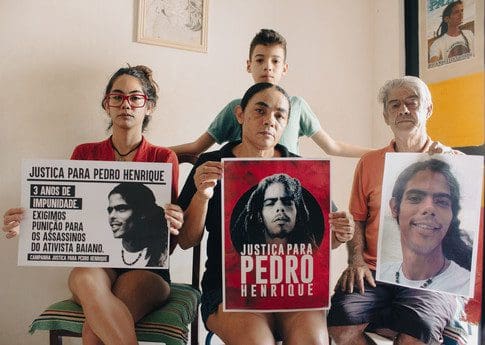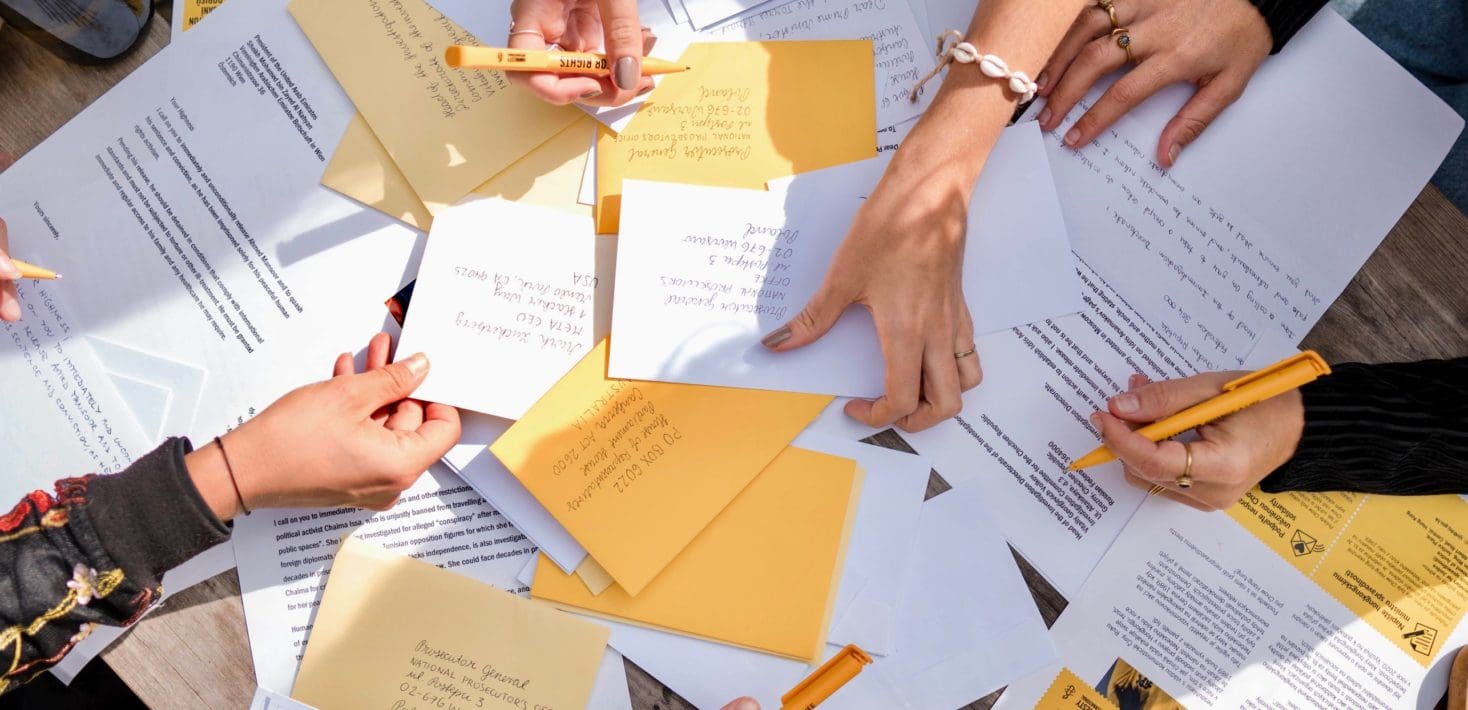Amnesty International is launching its annual global letter-writing campaign ahead of Human Rights Day on December 10, in a bid to transform the lives of people whose rights have been violated.
This year, Amnesty International is campaigning for justice with and for 11 people from around the world, whose human rights have been violated by states and corporations. This year’s campaign includes a Black man with an intellectual disability who was sentenced to death for murder, despite no evidence directly linking him to the crime; a woman who was convicted for trying to help a woman in Poland access a safe abortion; and two Indigenous leaders who are taking the Australian government to court to protect their community from rising sea levels caused by climate change.
“While the world grapples with record levels of conflict, political polarization stoking division and fear, growing inequality, and the existential threat of the climate crisis, the human rights of people the world over are under grave threat. From Ukraine to Israel and the Occupied Palestinian Territories, Ethiopia to Iran, Myanmar to Poland, and other corners of the world, people are suffering as their human rights are trampled on,” said Agnès Callamard, Amnesty International’s Secretary General.
“States are clamping down on activists and placing people’s rights under threat across the world. People who dare to speak out are facing jail sentences, while women are struggling to access healthcare and governments are taking insufficient action to prevent damage from climate change. That’s why Amnesty International’s global campaign, Write for Rights, is more important than ever before. It provides a way to put the power in the hands of ordinary people, taking extraordinary action to right these wrongs.”
"Amnesty International’s global campaign, Write for Rights, is more important than ever before. It provides a way to put the power in the hands of ordinary people, taking extraordinary action to right these wrongs."
Taking just a little bit of time to take action, through writing letters, emails and tweets, and signing petitions really does make a world of difference to the people Amnesty International is supporting through the campaign. Since Write for Rights started in 2001, millions of people have changed the lives of those whose human rights had been stripped from them. More than 50 million actions have been taken and over 100 people featured in our campaign have seen a positive change in their situation.
This year, Amnesty International’s campaign features 11 people, including:
- Thulani Maseko, who was shot dead in his own home for speaking out about Eswatini’s repressive laws and excessive state violence. No one has been held accountable for his killing.
- Thapelo Mohapi, a leader of the grassroots movement Abahlali baseMjondolo (AbM), is living in hiding due to threats to his life, simply because he is fighting for a better future for people in South Africa.
- Brazilian activist Pedro Henrique was shot dead, aged 31. Four years later, the police officers suspected of his killing are still on duty and a trial has yet to begin. Pedro’s mother, Ana Maria is bravely fighting for justice for his death.
- Rocky Myers, a Black man with an intellectual disability, is under sentence of death for murder in Alabama, USA, despite no evidence directly linking him to the crime scene and serious flaws in his legal case. The judge imposed a death sentence against the jury’s recommendation, a practice now outlawed in Alabama.
- Indigenous leaders Uncle Pabai and Uncle Paul are taking the Australian government to court to protect their homeland, their culture and their community from rising sea levels caused by climate change.
- Meta allowed anti-Rohingya hate to thrive on their Facebook platform, fueling the Myanmar military’s violence against people from the Rohingya ethnic group. Sawyeddollah, who sought refuge in Cox’s Bazaar in Bangladesh, wants to become a lawyer and is seeking remedy from Meta for those around him who have suffered heinous rights violations.
- Justyna Wydrzyńska was convicted for trying to help a woman in an abusive relationship access a safe abortion in Poland.
- Rita Karasartova is currently under house arrest for peacefully protesting in support of the protection of a freshwater reservoir in Kyrgyzstan, as the government continues to attack human rights.
- Ahmed Mansoor is a loving father and husband, a poet, blogger, and human rights defender. He is currently held in solitary confinement in prison in the United Arab Emirates (UAE) for speaking out about human rights violations in the country.
- Tunisian activist Chaima Issa is the daughter of a former political prisoner and has criticized the political situation in her country. She has been banned from travel and, if brought to trial, could face years in prison and a possible death sentence.

“Each and every person featured in our Write for Rights campaign has faced injustice, many for standing up for what they believe in. They have faced huge risks, imprisonment and, in some cases, they have been killed. We refuse to let their stories go untold. We are calling on people around the world to help us make a difference,” said Agnès Callamard.
To mark Write for Rights 2023, a host of events will take place across all regions of the world, including a half marathon in Zimbabwe, a vigil outside the Polish embassy in the UK, and public letter-writing events in South Africa, Mongolia, Czech Republic, Canada, Iceland, Taiwan, Germany, Nigeria, Togo and others. During the letter-writing events, activists can write two types of letters – one to the person with the power to make change happen, and the other to the people Amnesty is working with, so they know people are behind them.
Amnesty International’s Write for Rights campaign continues to see huge success around the world. Every year, the campaign has positive impacts – helping to release activists, secure justice for those whose rights have been wronged and protect people — proving that words really can make a difference.
Earlier this year, Joanah Mamombe and Cecillia Chimbiri were acquitted of one of the charges after they were arrested in 2020 for leading an anti-government protest. It is a significant step forward for the pair. As part of Amnesty’s Write for Rights campaign 2022, our supporters took action while Amnesty International Zimbabwe supported them throughout their trials.
"Thank you so much to our Amnesty International friends for writing all these letters. We are now beginning our journey to heal."
While reading the letters of support, Joanah said: “Thank you so much to our Amnesty International friends for writing all these letters. We are now beginning our journey to heal.” Amnesty International’s Write for Rights campaign truly does transform the lives of people whose rights have been violated.
Together, we can fight for their rights.

